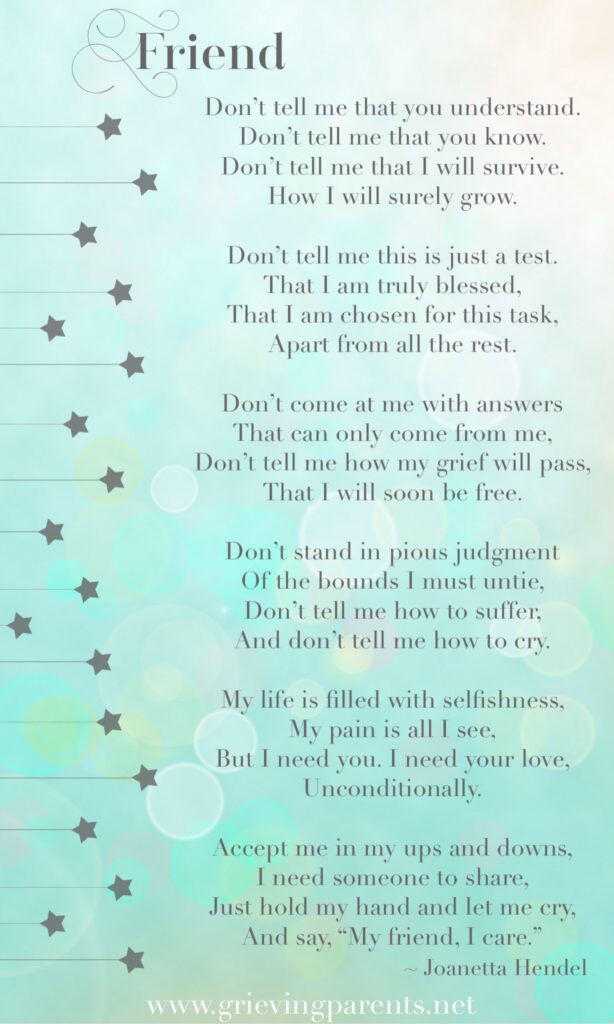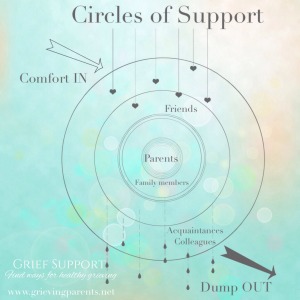Supporters help the bereaved survive this most horrendous time in their lives if they really know how to be supportive. There is nothing more difficult than knowing how and when to support the bereaved.

I have heard comments like “Time will heal all wounds” or “Maybe it was for the best”. These comments are uttered when supporters, as well as the bereaved, experience great distress and, are overwhelmed by the situation. Still, these comments cut like a shard of glass.
I heard and read so many bereaved’ unbelievable stories that it is time to educate society on the best things to say and give ideas and suggestions on what to do.
If you want to help anyone, be able to deal with bereavement in a better way.
People were well-meaning but for some reason said the most stupid things. One thing that sticks in my mind: One lady told us: “I know exactly how you feel, the same thing happened to us when our dog died.” ~ Gavin Blue
Resources for supporters of the bereaved
- Read the book Bridging the Grief Gap (Published September 2021)
- Read the blog post The Complete List Of Do’s And Don’ts When Supporting The Bereaved and adapt it to your specific loss situation.
- Consider training as a Grief Recovery Specialist. Find out more here.
Resources for supporters of bereaved parents
- Read Chapter 12 in the book Grieving Parents: Surviving Loss as a Couple
- Click here to receive the ‘5 Star Support Guide’ for the bereaved parent. You are welcome to share this with your friends and family.
- Watch ‘Grief Reflections: Discussions on Parental Bereavement’ to understand different aspects and topics. Find the archive of the discussion here.
- Follow Grieving Parents on Facebook
Our blog post, A Complete List of Do’s and Don’ts When Supporting Bereaved Parents, offers additional suggestions that will help you acknowledge the bereaved’s pain (not just bereaved parents), journey, and responses.
Resources for supporters of bereaved through homicide loss
- Check out articles from my colleague Katja Faber. Katja is the mother of a 23-year-old son, who was murdered. She calls herself a co-victim of homicide, a murder survivor. Read her article called ‘The challenges faced by homicide loss families’ here.
- Read the blog post The Complete List Of Do’s And Don’ts When Supporting The Bereaved and adapt it to your specific loss situation.
General resources
Self-care
Self-care is important for the bereaved and also for you as a supporter. Make sure you look after yourself so you can be a better support to them.
Circles of support
Comfort IN, dump OUT
In terms of ‘saying the right thing’ there is a simple rule to follow: Comfort IN, dump OUT. What doest this mean?
Imagine the bereaved couple in the centre of concentric circles, their closest family, siblings, grandparents in the next circle, close friends in the next, other friends and colleagues in the next, acquaintances in the next circle etc.
The rule states that where ever you are, you offer support to the people closer in the circles and you ONLY dump (=complain, cry, protest, say things like “it’s so unfair” or, if at all, use clichés like “it’s for the better”) to the people in the circles to the outside.
[Click on the image for larger picture]
Comfort
Anything you do or say towards the people closer to the centre of the circle needs to be supportive or offer comfort, otherwise don’t say or do it.
Being supportive to the parents or the close family is the best you can do for all of them.
Three simplest things to say:
- I am sorry for your loss.
- I am here for you.
- I don’t know what to say, I’m at a loss for words.
Whatever you do or say, remember these things:
- Acknowledge the parents
- Listen but do not try to fix
- Encourage and give them hope
- Practice the Art of Presence.
–> Read more in the book Grieving Parents: Surviving Loss as a Couple (Chapter 12)
Dump
Dumping is anything you do or say that makes it more difficult for the parents or the people in a circle closer to the parents than you:
- excessive crying in front of them
- whine, moan, complain, compare with other losses
- make statements like “It’s unfair”, “why you?”
- use any clichés like “God has a plan”, “it’s all for the better”, “at least he didn’t have to suffer”
Also, do NOT give advice. Even if you feel you have been where the parents’ have been.
Remember that it’s ok to cry or feel “it’s unfair”. You might even talk to someone about the losses you’ve experienced, just say it to someone in your circle or further out.
(Here is where the idea is from)
Grief Support Books

These books are some of my favourite grief support books as well as those authored by me (Nathalie Himmelrich), including a collection of books suggested by members of our peer support group May We All Heal. Please join us here.
When Grief is Raw
- Grieving Parents: Surviving Loss as a Couple by Nathalie Himmelrich
- Surviving My First Year of Child Loss: Personal Stories from Grieving Parents by Nathalie Himmelrich
- Navigating the Unknown: An Immediate Guide When Experiencing the Loss of Your Baby by Amie Lands
Grief & Healing
- Bearing the Unbearable: Love, Loss, and the Heartbreaking Path of Grief by Joanne Cacciatore
- Celebrating Pregnancy Again: Restoring the lost joys of pregnancy after the loss of a child by Franchesca Cox
- Empty Cradle, Broken Heart: Surviving the Death of Your Baby by Deborah L. Davis
- Far as the Curse Is Found: Searching for God in Infertility, Miscarriage, and Stillbirth by Abigail Waldron
- Ghostbelly by Elizabeth Heineman
- Grief Reiki by Sharon Ehlers
- Grief Diaries: Loss by Suicide by Lynda Cheldelin Fell and Sharon Ehlers
- Grief Diaries: Surviving Loss of a Child by Lynda Cheldelin Fell et all
- Grief Diaries: Loss of an Infant by Lynda Cheldelin Fell
- Grief Diaries: Will We Survive by Lynda Cheldelin Fell,
Daphne Greer, and Barbara J Hopkinson - Grieving with Hope: Finding Comfort as You Journey Through Loss by Samuel J. IV Hodges and Kathy Leonard
- Healing a Parent’s Grieving Heart: 100 Practical Ideas After Your Child Dies by Alan D. Wolfelt
- How To Go On Living When Someone You Love Dies by Therese A. Rando
- It’s Ok That You’re Not Ok: Meeting Grief and Loss in a Culture That Doesn’t Understand by Megan Devine
- The Grief Recovery Handbook by John W. James and Russell Friedman
- Three Minus One: Stories of Parents’ Love & Loss by Sean Hanish and Brooke Warner
- Understanding Your Grief: Ten Essential Touchstones for Finding Hope and Healing Your Heart by Alan D. Wolfelt
Creative Healing
- May We All Heal: Playbook For Creative Healing After Loss by Nathalie Himmelrich
- Avery’s Garden: Angel Inspired heARTwork for Bereaved Families (Volume 1) by Tara Denz
- Facets of Grief: A Creative Workbook for Grieving Mothers by Franchesca Cox
- When You Grieve from A to Z: Coloring Through Grief and the Alphabet by Ginny Limer
For Mothers
- Sunshine After the Storm by Alexa H Bigwarfe
- Invisible Mothers: When Love Doesn’t Die by Emily R Long
- You Are Not Alone: Love Letters From Loss Mom to Loss Mom by Emily R Long
For Fathers
- A Guide for Fathers: When a Baby Dies by Tim Nelson
- From Father to Father: Letters From Loss Dad to Loss Dad by Emily R Long
- Grieving Dads: To the Brink and Back by Kelly Farley and David DiCola
- The Griefcase: A Man’s Guide to Healing and Moving Forward in Grief by R Glenn Kelly
Supporting Children
- Healing Your Grieving Heart for Kids: 100 Practical Ideas, Alan D. Wolfelt
- Lifetimes: The Beautiful Way to Explain Death to Children, Bryan Mellonie and Robert Ingpen
- Tear Soup: A Recipe for Healing After Loss by Chuck DeKlyen and Pat Schwiebert
Children’s Books
- Always My Twin by Valerie R. Samuels
- I Miss You: A First Look at Death, Pat Thomas
- Someone Came Before You by Pat Schwiebert
- Something Happened by Cathy Blanford
- The Invisible String by Patrice Karst
- We Were Gonna Have a Baby, But We Had an Angel Instead by Pat Schwiebert
- When Children Grieve from A to Z: Coloring Through Grief and the Alphabet by Ginny Limer
Spiritual, Religious, Inspirational
- A Grace Disguised: How the Soul Grows through Loss by Jerry Sittser
- A Grief Observed by C.S. Lewis
- Choosing to SEE: A Journey of Struggle and Hope by Mary Beth Chapman and Ellen Vaughn
- I’m Not Dead, I’m Different: Kids in Spirit Teach Us About Living a Better Life on Earth by Hollister Rand
- Joy Cometh in the Morning: A Story of Healing from the Loss of a Child by Fran C. Hafen
- Lament for a Son by Nicholas Wolterstorff
- Understanding Death: An Introduction to Ideas of Self and the Afterlife in World Religions by Angela Sumegi
- Your Soul’s Gift: The Healing Power of the Life You Planned Before You Were Born by Robert Schwartz
- I’m Not Dead, I’m Different: Kids in Spirit Teach Us About Living a Better Life on Earth by Hollister Rand
- Joy Cometh in the Morning: A Story of Healing from the Loss of a Child by Fran C. Hafen
- Lament for a Son by Nicholas Wolterstorff
- Understanding Death: An Introduction to Ideas of Self and the Afterlife in World Religions by Angela Sumegi
- Your Soul’s Gift: The Healing Power of the Life You Planned Before You Were Born by Robert Schwartz
Memoirs
- An Exact Replica of a Figment of My Imagination: A Memoir by Elizabeth McCracken
- Expecting Adam by Martha Beck
- Holding Avery: A Memoir by Heidi Chandler
- I Will Carry You by Angie Smith
- Love Mom: A Mother’s Journey from Loss to Hope by Cynthia Baseman
- Rare Bird: A Memoir of Loss and Love by Anna Whiston-Donaldson
Journals
- Life Without the Baby Journal: Redefining Life, Self, and Motherhood After Loss by Emily R Long
- On Coming Alive: Journaling Through Grief, Lexi Behrnd
Links on this page are affiliate links – all proceeds go to the Grieving Parents Support Association (GPSA) in order to donate our resource books to parents in need.

